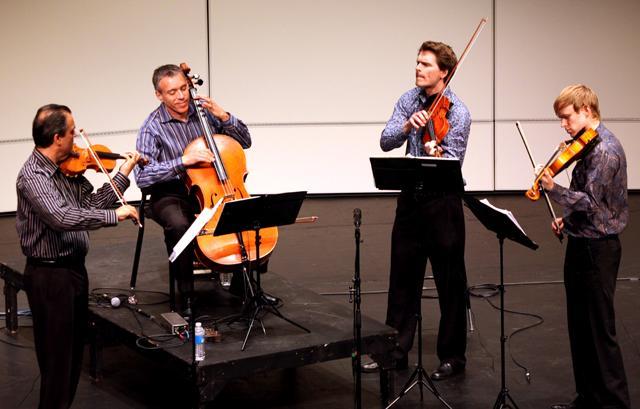
© NCSU Student Media 2012
Getting into a groove, The Turtle Island Quartet performs their rendition of 'A Love Supreme' by jazz musician John Coltrane. The group recieved two Grammy awards, and is known for mixing musical styles and playing classical instruments in unconventional ways. Photo by Natalie Claunch
David Balakrishnan , the founding member of the Grammy Award group, Turtle Island Quartet, sat before a crowd in the Walnut Room.
“You don’t inflict your vision on the others,” Balakrishnan said on composing. “You give them something they can find themselves in, and then take credit for it.”
The crowd laughed, but Balakrishnan was hinting at what Turtle Island is all about.
Beside Balakrishnan sat the cellist Mark Summer, who has been described as a cellist, bassist and drummer all rolled into one.
Both men hails from Los Angeles, and “both did the classical training,” Summer said. “…I’m still recovering from it … I hated being in orchestra.”
Summer, however, found his musical calling when he teamed up with Balakrishnan some 25 years ago to create something that wasn’t quite classical, wasn’t quite jazz or rock, but somewhere in the middle.
Turtle Island’s performance was an ode to John Coltrane , featuring music composed by him and music inspired by him, with the second half of the performance dedicated to the jazz legend’s magnum opus, A Love Supreme.
Coltrane drew a lot of influence from fellow jazz icon Miles Davis, as well as Sitar legend Ravi Shankar . In Love Supreme, Coltrane drew from the eastern musical practice of one, simple bass line running below the higher melodies, like a chant. This facet of the piece, which repeats the words “a love supreme” like a mantra, “was a prayer to God,” Balakrishnan said.
Throughout the performance, Summer utilized his instrument to the maximum. With his cello hooked up to an amp and a microphone, Summer used a foot peddle to switch back and forth between the two forms of amplification. Throughout the performance the virtuosic cellist not only masterfully strummed the strings of his instrument, but also plucked them in order to mimic the sound of an upright bass (a standard among jazz groups), and would gracefully slap the front of his instrument to produce the sounds of a drum kit. From beginning to end, Summer’s hands never stopped moving.
Along with Summer and Balakrishnan , Turtle Island Quartet features two other well known musicians in their own right. The second violinist, Mads Tolling, hails from Coppenhagen , Denmark, and is well adept at the jazz-style music the group performed Saturday evening.
Tolling has won multiple accolades for his musicianship, and regularly tours with jazz star Stanley Clark. The other member of the group is Jeremy Kittel on Viola. Kittel has won national recognition for his Celtic music stylings , as well as his jazz and improvisational talents.
Together, these four men performed one of the most powerful pieces in the corpus of jazz. And as they left stage after the conclusion of their encore, the crowd erupted into applause, giving the group a standing ovation.
“The quartet is a symbol of the genius of that era,” said Balakrishnan on the 19th century origins of the quartet.
With this genius form, the members of Turtle Island attempted to best express the vision of Coltrane , a man they compare with the great minds of European composition.